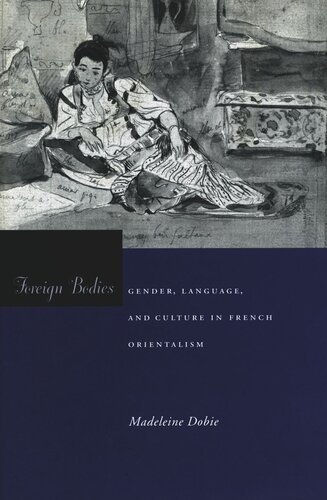

Most ebook files are in PDF format, so you can easily read them using various software such as Foxit Reader or directly on the Google Chrome browser.
Some ebook files are released by publishers in other formats such as .awz, .mobi, .epub, .fb2, etc. You may need to install specific software to read these formats on mobile/PC, such as Calibre.
Please read the tutorial at this link: https://ebookbell.com/faq
We offer FREE conversion to the popular formats you request; however, this may take some time. Therefore, right after payment, please email us, and we will try to provide the service as quickly as possible.
For some exceptional file formats or broken links (if any), please refrain from opening any disputes. Instead, email us first, and we will try to assist within a maximum of 6 hours.
EbookBell Team

4.1
60 reviewsBuilding on the critical foundations established by Edward Said in Orientalism, Foreign Bodies examines the relationship between the Orientalist tradition in French art and literature and France's colonial history. It focuses on a central dimension of this exchange: the prevalent figure of the "oriental woman," and the interplay of race and gender in both domestic and colonial history. It also offers a genealogy of contemporary French attitudes to Islamic culture, in which beliefs about sexuality and gender relations continue to occupy a privileged place. The author examines the extent to which the rhetorical status and political implications of Orientalism register the changing circumstances of French colonial activity, tracing the convergence, or divergence, of colonial practice and the literary record. She also argues against the tendency, in both historical and theoretical writing on colonialism, to divide center from margins, metropolitan from colonial. Instead, she shows how colonial products and ideas permeated the domestic culture and shaped its evolution. Finally, the book proposes that the feminine figures of Orientalist texts are often interwoven with representations of language, and more specifically with representations of language as an alien and resistant code—something other than the transparent medium of ideas. It suggests that in promoting awareness that language is not simply the neutral medium of thought and experience, these veiled figures of language function as "foreign bodies," creating disruptive effects within an economy orchestrated toward the production of knowledge of the other. However, the book also argues against the view, espoused by certain critics, that the self-reflexivity of Orientalist writing fully counteracts its polarizing political effects, arguing instead for a process of "double reading" that acknowledges both the geopolitical power encoded within Orientalist representation and the ways in which specific texts resist this power.